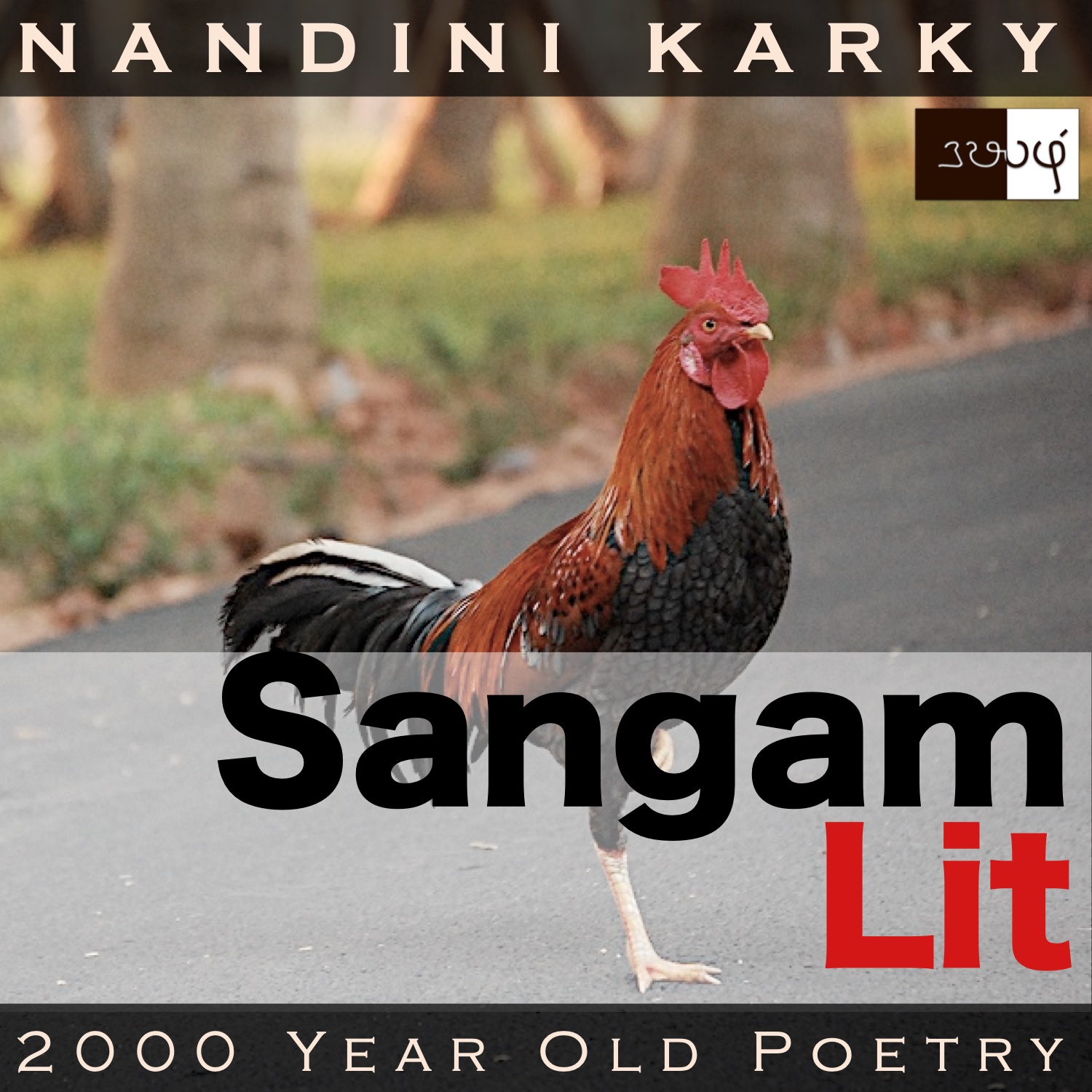Podcast: Play in new window | Download
Subscribe: Apple Podcasts | Spotify | Amazon Music | Android | iHeartRadio | TuneIn | RSS | More

In this episode, we perceive the fury of a person, woken up from sweet slumber, as portrayed in Sangam Literary work, Kurunthogai 107, penned by Madurai Kannanaar. The verse is situated in the farmlands of ‘Marutham’ and speaks in the voice of the lady to a rooster, conveying her ire at the bird’s crowing in the morning.
குவி இணர்த் தோன்றி ஒண் பூ அன்ன
தொகு செந் நெற்றிக் கணம்கொள் சேவல்!-
நள்ளிருள் யாமத்து இல் எலி பார்க்கும்
பிள்ளை வெருகிற்கு அல்குஇரை ஆகி,
கடு நவைப் படீஇயரோ, நீயே-நெடு நீர்
யாணர் ஊரனொடு வதிந்த
ஏம இன் துயில் எடுப்பியோயே!
Thoughts of torment fill this verse! The opening words ‘குவி இணர்த் தோன்றி’ meaning ‘the grouped clusters of the flame-lily’ refreshingly talk about a flower that delights the eyes with its red hue. A one-line portrait of a bird is etched in ‘தொகு செந்நெற்றிக் கணம்கொள் சேவல்’, which means ‘a rooster, having a bunched-up red forehead and surrounded by a flock’, detailing the features of this familiar bird with a stylish hairdo and one, which is an alpha male amidst the flock of hens! Other animal members in the domestic scene can be seen in ‘இல் எலி’ meaning ‘house rat’ and ‘பிள்ளை வெருகு’ meaning ‘young one of a wild cat’. The words ‘கடு நவைப் படீஇயரோ’ meaning ‘may you suffer terrible punishment’ is a malicious wish. Wonder what happened to make someone say these words! Ending with the words ‘ஏம இன் துயில் எடுப்பியோயே’ meaning ‘you woke me up from a pleasant sleep’, the verse welcomes us within.
What a contradiction in seeing sweet sleep and severe punishment in the same verse! The context reveals that the man and lady had been leading a happy, married life when the man parted away to gather wealth. Long was his absence and the lady languished during this time. One day, he returned and the lady was ecstatic with joy. The next morning, suddenly waking up, the lady says to a crowing rooster, “Akin to bunched-up clusters of shining flame-lilies, is your fused red forehead, O rooster leading a flock! For the wild cat’s little one, which comes hunting for a house rat in the dark of the midnight hour, may you become food for many days and suffer severe punishment. Because you have roused me from the safe and sweet sleep I was relishing with the man from the prosperous town with copious waters!” With these words, the lady expresses her animosity towards the crowing rooster at the crack of dawn.
Why the burning words to that poor rooster that was simply going about doing what it does every day! Let’s delve into the lady’s words to find out. Even a supposed enemy, the Sangam folks seem to address with words celebrating their beauty. Here, the lady starts by mentioning the stunning red comb on the rooster’s forehead, equating it to clusters of flame-lilies and talking about how the rooster was the head of a huge flock. After this address as if to an esteemed friend, the lady’s words heads in the opposite direction and wishes for misfortune to fall on this bird’s head. What misfortune exactly, the lady clarifies by talking about how the little one of a wild cat, which comes in the dark hours of the night, hoping to catch a prey of a house rat, and she wishes that the rooster becomes the food for this wild cat for many days, making the bird suffer severely!
Why, when we cry in alarm, wondering about the lady’s unexpected kindness to that wild cat and her cruelty towards the rooster, the lady reveals the reason. She says this rooster was the one, which announced the arrival of dawn and pushed her out of her sweet and cosy sleep with her beloved. If the rooster could speak, it would shrug its feathered shoulder and say, ‘just doing my duty, love’! In any case, the angry words of the lady serve one purpose in this song – to express the extent of the passion she feels for her man and how one night after his long absence seemed not to be enough to fill that abyss of longing in her. Her words will have no effect on the bird, which will continue to crow in the mornings, with no thought about separated lovers! However, the lady may find relief in verbalising her anger. So long as it remains as words, these will be swept away by the winds of time. This reminds me of a modern self-help idea – the act of pouring your thoughts in a letter to the person, who has hurt you, and then, without sending it, destroying that letter. Fascinating to see how poetry of the past and the psychology of the present converge in this suggestion to express one’s emotions, unpleasant though they may be!




Share your thoughts...